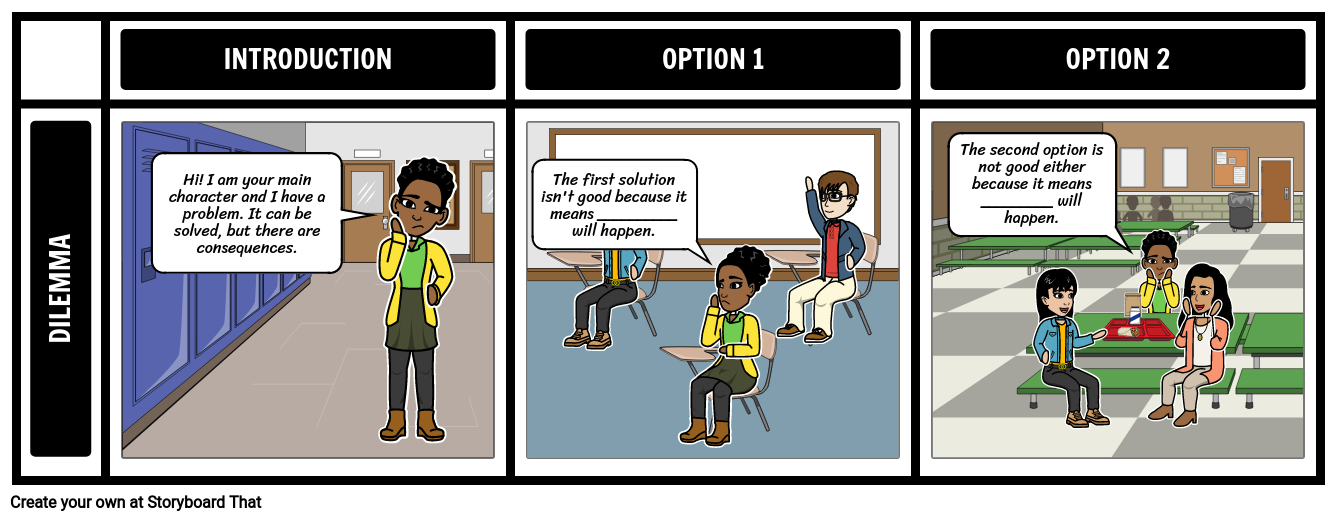Imagine this: you’re working on a project with a team, and you notice a colleague taking credit for someone else’s work. Everyone seems to be aware of it, yet no one speaks up. This silence creates a tension that sits heavy in the room, but you’re unsure whether you should speak up or remain silent. This is an example of a situation that pushes you to confront an ethical dilemma. These dilemmas aren’t always dramatic or obvious, but they arise frequently in our daily lives, testing our values and pushing us to make choices that resonate with our moral compass.

Image: www.estrategiapatrimonialplus.com
Ethical dilemmas are complex situations where different values clash, leaving you with no easy solution. They demand careful consideration as the choices you make will have consequences, not just for yourself, but also for others involved. This article explores various situations that present ethical challenges, providing you with tools to navigate them effectively.
Exploring Ethical Dilemmas: When Your Values Collide
Ethical dilemmas are more common than you might initially think. They can pop up in your personal life, professional career, or even within a community. Each scenario presents unique challenges and calls for a thoughtful approach.
1. The Whistleblower’s Dilemma: Imagine you witness illegal or unethical practices within your workplace. On one hand, you have a moral obligation to speak up and expose these actions. On the other hand, you might face repercussions like losing your job or damaging your reputation. This situation often puts individuals in a difficult position, forcing them to weigh their desire to do the right thing against the potential risks.
2. The Conflict of Interest: Imagine you work in a company that has a large client who is also a family friend. One day, you discover that the client is engaging in unethical practices. You’re stuck in a conflict of interest, torn between your professional responsibilities and your loyalties to friends and family. This delicate balance highlights the complexities of ethical dilemmas and the challenges of separating personal and professional decisions.
3. The Dilemma of Privacy vs. Safety: In the digital age, we face constant battles over privacy. Imagine a scenario where your social media posts are being used by your employer to gauge your work ethic or personal habits. This situation raises questions about the boundaries of privacy and the extent to which companies have the right to monitor their employees’ digital activity. It’s a complex dilemma where individual rights clash with the concerns of security and workplace productivity.
4. The Dilemma of Compromise: We often encounter situations where we need to make compromises to achieve a desired outcome. This can be particularly complex when the outcome is beneficial to the majority but harmful to a minority. Imagine a project that benefits the community but requires the displacement of a few families. This scenario forces you to choose between the greater good and the individual needs of those affected, posing a difficult ethical challenge.
5. The Dilemma of Truth and Deception: Every situation demands honesty and transparency, but sometimes, the truth can be painful or even dangerous. Imagine you discover that a close friend is involved in a risky venture. You know that telling them the truth could save them from harm, but you also fear their anger and resentment. This situation forces you to choose between honesty, which could lead to conflict, and deception, which could protect your friend but also compromise your integrity.
Navigating Ethical Dilemmas: A Framework for Informed Decisions
Facing an ethical dilemma can be overwhelming, but there’s a structured approach to guide your decision-making:
1. Identify the Key Ethical Issues: Start by clearly defining the core values and principles at conflict in the situation. What are the competing interests? What are the potential consequences of each choice?
2. Gather Relevant Information: Before making a decision, thoroughly research the situation. Gather all relevant facts, perspectives, and information. This will help you understand the context and potential consequences of your choices.
3. Consider Alternative Solutions: Instead of settling for the first solution that comes to mind, explore multiple possibilities. Can you find a compromise? Are there other ways to approach the situation that might avoid harming anyone?
4. Seek Guidance and Consultation: Don’t hesitate to seek advice from trusted individuals. Talk to a mentor, colleague, or someone you respect for their ethical judgment. This can provide you with fresh perspectives and help you assess the situation from different angles.
5. Assess Potential Consequences: Carefully consider the potential consequences of each option. Weigh the potential benefits and harms for yourself, those involved, and any broader community that might be affected.
6. Make Your Decision: Finally, use your judgment and values to guide your decision. Choose the option that aligns most closely with your ethical principles and values, even if it isn’t easy or popular.
7. Reflect and Learn: After making a decision, take the time to reflect on your choice. Consider what you learned from the experience. What worked well? Where did you struggle? This reflection will help you grow and make more informed choices in future ethical dilemmas.

Image: www.chegg.com
Which Situation Below Is An Ethical Dilemma That Requires Attention
Ethical Dilemmas: A Continuous Journey
Ethical dilemmas are inherent parts of life. There’s no one-size-fits-all solution. Navigating them requires empathy, critical thinking, and a strong commitment to personal values. Remember, ethical decision-making isn’t about finding the perfect solution but about actively engaging with these situations and making choices that reflect your principles and resonate with your sense of morality.






